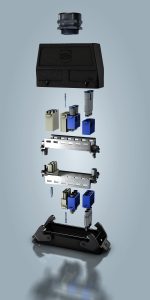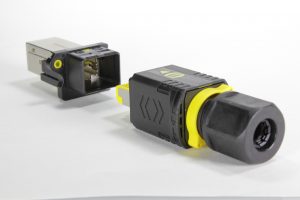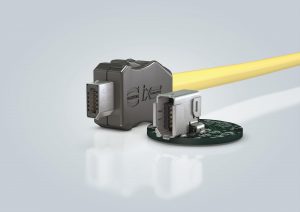
Harting remains focused on connection to Industry 4.0 customer base
Stephen Law
Automation / Robotics Electronics Interconnect Regulations & Standards Engineering IoT Supply Chain connectors connectors Industry 4.0 Industry 4.0 Interconnect interconnect4.0 Innovator: One on one with Philip Harting

Philip Harting, Chairman of the Board, Harting Technology Group
Initially established and often recognized throughout the electronics industry as a leading global connector or interconnect solution provider, Harting Technology Group of Germany has found its stride serving its industrial customer base globally, as it conforms to the emerging model of Industry 4.0, responsible for driving IoT and IIoT convergence. In this feature, EP&T sits down with Philip Harting, Chairman of the Board, to discuss his views on these subject areas.
Q. Harting has always had a reputation as an innovative and highly reliable component manufacturer. Now, the company is positioning itself as a solutions provider for industry. How are you accomplishing this change and how will this impact the customer?
A. Harting has developed from a pure component manufacturer into a provider of systems and complete solutions that offers hardware and software under a single roof. Customer requirements – and consequently production – are thus more customised. Operators and users require products and services which meet their special needs structure. The number of possible variants and areas of application of the products, along with the complexity of the systems, machines and processes, all require holistic, networked thinking in conjunction with manufacturing that implements information technology. This is possible with turnkey solutions and offerings that are developed in collaboration with customers. In addition, Harting has initiated a comprehensive process to digitise the company, together with all its manufacturing and business processes. This process extends from production, with a significant increase in flexibility and efficiency, to the development of customised, service-oriented products, all the way to collaborative undertakings with our customers to jointly develop innovations. The goal is to be flexible, customer-oriented, and be able to respond in a timely and cost-effective manner. This creates added value for the customer, regardless of whether for specialised mass production or serial mass production.
Q. How will this repositioning affect the product portfolios you are known for, including board-level connectors? Are you going to move away from certain product areas to invest more in other, newer fields?
A. Harting is an innovative technology group. Analysing trends, developing new components, applications and solutions – this expands the application possibilities of our products and opens up new potential uses and additional markets. Digitisation plays a decisive role here. Accordingly, our portfolio is expanding towards miniaturisation, modularity and high component variability. A good example of this is our MICA (Modular Industry Computing Architecture). This is an open and modular platform that enables customers to easily, quickly and cost-effectively implement their Integrated Industry projects and optimise their business model.

HARTING has developed a new compressed air module to meet the increased demands on interfaces for flexible production processes – the Han Pneumatic Module Metal. It employs robust, durable high mating cycle contacts made of metal that can be plugged and unplugged at least 10,000 times.
Q. Industry 4.0 is driving IT/OT convergence, leading to more smart technologies and systems. Looking ahead five years, what capabilities should we expect to see in widespread usage, especially in terms of field level productivity?
A. Digitization is an irreversible process that will accelerate further in the years ahead and extend to all areas of industry and society. This applies both to people’s everyday lives, their private lives, and above all the way in which work and manufacturing is done, company-internal structures, training and qualification, communication with customers, and partners and suppliers. The essential core of Industry 4.0 is the digitisation of the value chain in vertical and horizontal directions. Companies’ future welfare and competitiveness, as well as that of whole economies, will depend on the success of digitisation. But digital transformation is not an end in itself, but rather a means to an end. Customer value is the decisive factor here. Anyone who doesn’t think in terms of the customer will lose the customer.
Q. How has the role of the connector or interconnect device itself altered with the emergence of these new technologies – especially the digital era.
A. Industry 4.0 brings a significant increase in importance to the classic industrial connector. The connectors’ simple and quick handling, their robustness, and an extended range of applications are all highly important. The modularisation, customisation and flexibility of production processes require a corresponding adaptation of machinery and systems in the shortest possible time. For production of e.g. lot size 1, new or re-configuration has to be quick and easy. This is what classic industrial connectors do thanks to new functionality. Connectors play a central role when adding or replacing a module. This is done by our Han-Modular®, by way of example. Its docking and undocking, active locking, visualisation and communication capabilities transform it from a passive installation into a smart infrastructure component.

The modular PushPull V4 housing accommodates mating faces for all lifelines of I4.0 – Data, Signal und Power. PushPull V4 Industrial: The fast, secure and tool-free solution for device cabling.
Q. Describe the importance of your relationship with the customer when developing new products and solutions – especially as they relate to their application specific needs.
A. The production of the future is more flexible, more customised, and more individual, down to lot size 1. The motto is made-to-measure rather than mass production. Together with the customer, we develop tailor-made components and solutions for a wide variety of applications and conditions. Thus, the topic of partnering is becoming more and more important in industry. Customers’ requirements and the products developed together with them are decisive for mutual success. Being close to regional/national markets, we know the respective trends and tendencies and are able to proactively develop new concepts and technological innovations.
Q. How does Harting remain at the forefront of its field amid the intensity of competition in a global marketplace?
A. Harting is a development-intensive and innovation-driven technology company with decades of experience and a global network of development, production and sales companies. Our highest maxims are quality, continual new developments and innovation. Leadership in the relevant markets and success in global competition is made possible through permanent contact and close proximity to our customers, as well as collaboration with science and the relevant university institutions. “We want to shape the future with technologies for people” – this aspiration is part of our corporate vision and commitment. We want to be drivers and shapers of technological development.
Q. What advantages does Harting have as a privately held or family-owned company, versus that of a publicly-traded concern?
A. Since being founded in 1945, Harting has been an independent family-run business, 100% owned by the family, which is now in the second and third generation. Economic independence is the supreme maxim of our company philosophy. Independent family-owned businesses follow their own, long-term strategy based on ethical-social values and principles. They have a special creative will and are generally more successful because, unlike listed corporations, they aren’t constrained by the rationale and compulsion to seek short-term profits for the shareholders. Family-run businesses usually feel an obligation to their locations, the home region and their employees, and are engaged both socially and locally. This results in employees feeling a high degree of identification and loyalty towards the company, as well as solidity and trust, and there are also entrenched, typically long-standing relationships with customers and suppliers.
These characteristics justify the good reputation of family businesses and form the basis of their special competitive advantage compared to “faceless”, large corporations which are beholden to their shareholders.
Q. Despite growing resistance in some countries, efforts continue to
build more free trade zones? How has this movement benefited you
and how might it change your business in the years ahead?
Conversely, what would be the impact if more countries retreat into protectionism?
A. Competition and progress require open markets and international exchange. As a globally operating company, Harting is firmly committed to this. We know that compartmentalisation, trade barriers and other obstacles hinder development, inhibit growth, and harm prosperity. The economic challenges of the future can only be mastered through free access to all markets.

HARTING’s ix Industrial helped the company win the “Innovator of the Year” award in November 2017.
Q. Harting has taken recent steps to expand its footprint within parts
of Asia. Describe how this represents the firm’s move from being perceived
as a European player to a global player.
A. Asia has long been a key region for Harting and we have several subsidiaries there, e.g. in China, Singapore, Korea, Taiwan, Malaysia and Japan, as well as our own production facilities in Zhuhai/China and Chennai/India. As a result, we’re close to our customers, know the region, the markets, our customers’ needs and specific requirements, and are able to co-determine and anticipate technological trends. Around 24 percent of Group sales of € 672 million (FY 2016/17) are now attributable to the Asia/Pacific region. Harting is a global player and is at home in the most important international growth markets and future industries, e.g. automation, transportation, wind energy, and robotics.
Q. Digitization and artificial intelligence (AI) are contributing greatly to
Industry 4.0, where do those elements fit into Harting own
manufacturing and logistics plans in the coming years?
A. The digitisation of all our structures and processes with the appropriate training and participation of our employees is a fundamental strategic decision at Harting. We achieve higher efficiency and flexibility as a result, and we explore the possibilities and implementation of the smart factory in our own production. Harting finds answers to how digitisation works not only in theory, but above all in its own, in-house practice. For example, our Harting MICA assumes condition monitoring on injection moulding machines. Furthermore, we use different RFID solutions in the warehouse area. Many processes will be completely digital in our European Distribution Center (EDC), our new logistics centre which will be completed in 2019.
Q. Has Harting faced any specific challenges in sourcing within
supply chain specific material requests for the construction of its interconnect devices?
A. To date, we haven’t faced any significant challenges on this issue. Harting places high priority on trustworthy, reliable cooperation with suppliers and partners, and this is gaining even more significance as part of Industry 4.0. Harting regularly receives awards for its long-term cooperation and its high quality, most recently in the transportation sector, for example from rail vehicle manufacturer Bombardier in 2015 and Deutsche Bahn in 2017.
